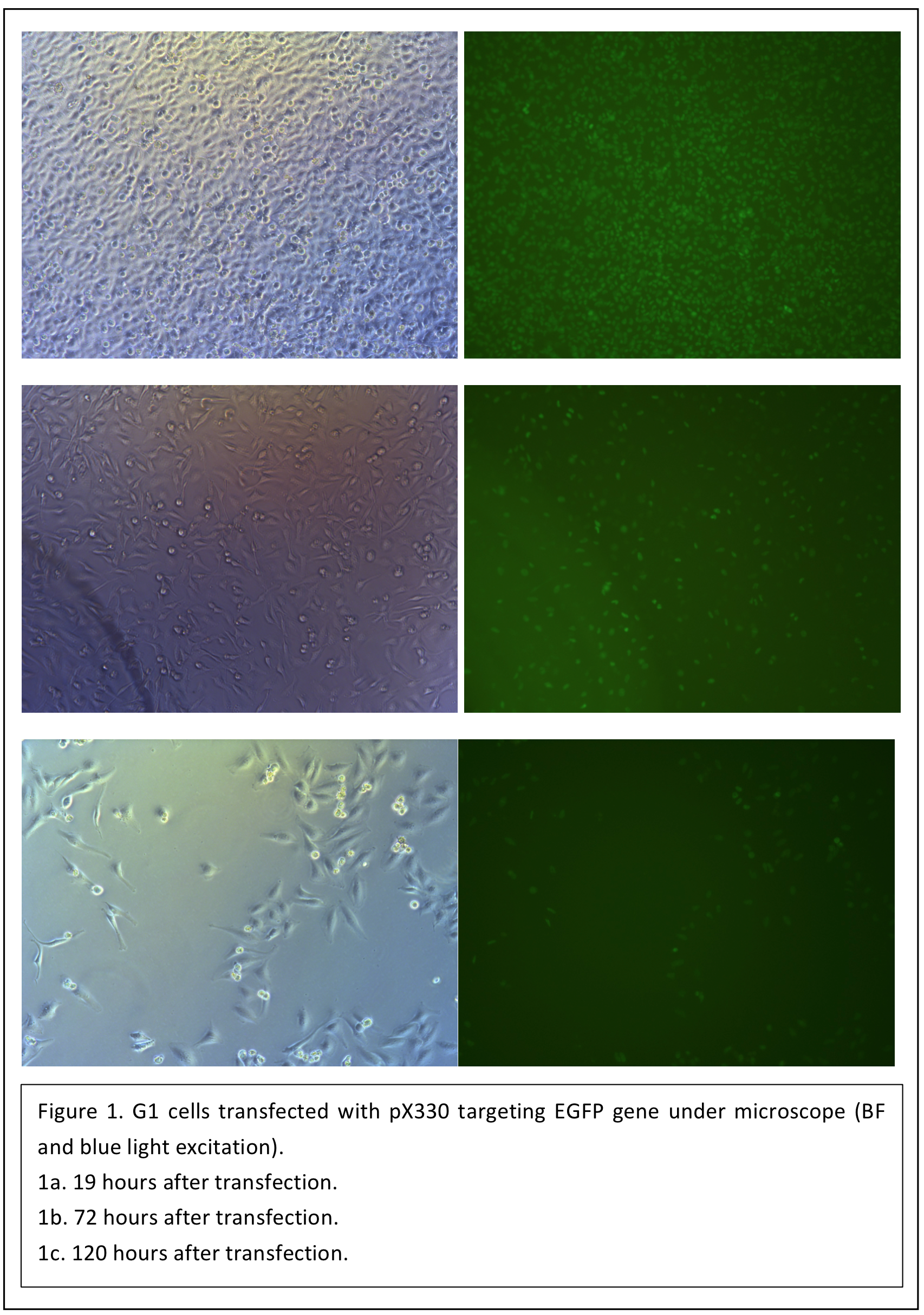Team:SUSTC-Shenzhen/Notebook/HeLaCell/G1 cells transfected with px330
From 2014.igem.org
Notebook
Elements of the endeavor.
Contents |
Test of the function of Cas9
2014/9/13 Insure the function of modified px330 targeting EGFP gene!Introduction:
The Cas9 gene stably transfected into the genome of HeLa is cloned from Zhang Feng pX330. To make sure that the original Cas9 gene and the gRNA targeting EGFP have supposed function, the pX330 with the gRNA targeting EGFP is endotoxin - free extracted and transfected into G1 HeLa cells which has been stably transfected with EGFP gene. It is expected that EGFP gene will be cut off and most of them will has a frame shift mutation due to the non-homologous end joining. Then there will be green fluorescence decline in G1 cells.
Materials:
- G1 pool cels (HeLa stably transfected with EGFP gene) seeded in 24 well plate, about 90% confluence.
- Lipofectamine® 3000 Reagent
- Opti-MEM (Gibco Invitrogen®)
- Endotoxin-free etraced px330 inserted with gRNA targeting EGFP (1514.9ng/μL)
- DMEM (CORNING) (Hi-clone Thermo) with FBS(Gibco Invitrogen)
- Complete medium with Penicillin-Streptomycin and 2.8μg/mL blasticindin.
Procedures:
- (13/9) Seed 24-well plate with G1 pool cells, 100,000 cells per well.
- (10:00 pm, 14/9)Replace the medium with DMEM with 0.5 mL 10% FBS(without any antibiotics)
- Dilute DNA: add 0.33μL pX330 (500ng) to 25μL Opti-MEM medium and add 1μL P3000 reagent, mix well.
- Dilute Lipofectamine 3000 Reagent in Opti-MEM Medium: 25μL Opti-MEM Medium +0.75μL Lipofectamine 3000 Reagent, mix well.
- Add the 25 diluted Lipofectamine 3000 to the25μL diluted DNA of (1:1 ratio), mix well.
- Incubate for about 5min.
- Add DNA-lipid complex (50μL per well) to cells drop by drop and uniformly, shake the plate.
- After 10h, change the medium with the complete medium with 10% FBS, Penicillin-Streptomycin and 2.8μg/mL blasticindin.
- (16/9) Passage one G1 cells into two wells.
- Observe the cells on the following days and read the cells with flow cytometer.
Result:
Fluorescence Observation
After transfection, the intensity of part of cells decreased and then some cells without fluorescence could be observed (Fig.1 ) while before transfection of pX330 nearly cells without fluorescence was very hard to find out which indicates a rather high percentage of cells stably transfected with EGFP gene and with the expression.

The results of flow cytometry:
From the data of flow cytometry, a strange phenomenon is observed: the fluorescence decreased first and increased again which indicates that the cells whose EGFP gene has been destroyed died or grew slower. It finally comes out that the expression Blasticidin resistance gene following the EGFP gene is affected since they are under the control of the same promoter. So we repeated the experiment and use the medium without Blasticidin to culture G1 cells transfected with pX330 (fig 4d). Although the percentage of the cells had been transfected with pX330 is not known, the percentage of the positive cells decrease to about 45% or 60%, which still shows high efficiency of Cas9 protein and gRNA targeting EGFP.



 "
"